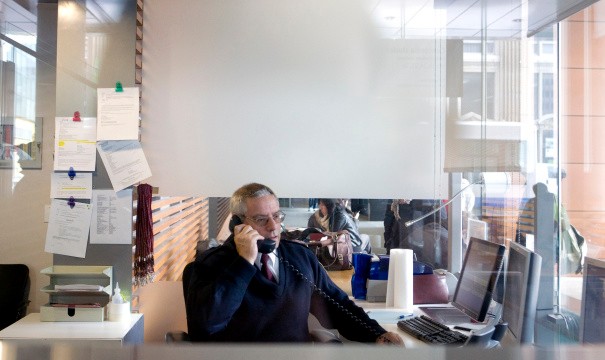Evolving security
 “We are serving a population of particularly smart people who want to understand the reason behind security procedures. Because we respect that, we work to be flexible and responsive to freedom of expression and social change.”
“We are serving a population of particularly smart people who want to understand the reason behind security procedures. Because we respect that, we work to be flexible and responsive to freedom of expression and social change.”
The 2017-2018 academic year was one of change, renewal and updating for Concordia’s Security Department. Director of Security Jacques Lachance acknowledges that it was busy.
“We brought in a new operations system, renewed a contract with security agents, reviewed over 150 Departmental Emergency Preparedness Plans and even revised our own operational procedures. At the same time, we continued to train emergency responders from across the university and fulfilled our regular security mandate.”
Agreement renewed with agents
It is easy to forget that security agents on campus are actually employed by an independent firm. Lachance knows that many are seen as members of the community thanks to their good nature and their understanding of the university environment.
“We have been working with many of the same people since 2005. They are well integrated and much appreciated. They know they are working with a very diverse population and are used to handling challenging situations.”
Despite that record, the university still issued a call for submissions prior to renewing the contract for another three years, with an option to extend until 2023.
“We had five bidders but the current contractor still came out on top. We finalized the new agreement promptly and really appreciated the support we received from the university’s Procurement and Legal departments.”
New operations system
“Because of limitations that we identified in the past, we undertook a survey of other universities to learn what system they used for responses, reporting and analysis. When we got their feedback on Report Perfect, we brought it to the financial committee for review in February 2017.”
By May of 2017 the plan to replace the old system was formally submitted. In September, the integration phase began. On January 1, 2018, it was up and running.
“We’re very pleased with the new system. It was easy enough to integrate into our current operations and tools and it has even helped us identify problematic areas that we have since been able to correct.”
Lachance says the new software is helping to generate more accurate data, to undertake better analysis and even to loop in university sector leaders in a more streamlined fashion.
“It’s now easier to record details of event as they happen, rather than having to enter them after an intervention. We are able to provide more accurate analysis to the various university sector leaders and focus more on our prevention efforts.”
A critical look inward
Each university unit has its own Emergency Preparedness Plan. It helps departments respond and continue to operate when problems like flooding, power outages or other emergencies occur. During the 2017-2018 academic year, Security revised and updated over 150 different plans. At the same time, Security trained 115 new managers and members of the Certified Emergency Response Team (CERT) to ensure they know what to do during a crisis.
Another review undertaken focused on the daily operations of Security Services itself. Lachance asked for the help of an internal and an external expert. He wanted to verify everything from procedures, to tools, to costs.
“I think some people were surprised when I suggested an audit of our own operations, but it was worth it. We identified ways to do things more quickly and efficiently, including in a financial sense. We also found ways to improve our reporting and our follow-up to incidents.”
2017-2018 also saw the move of the Emergency Operations Centre (EOC) from the Engineering, Computer Science and Visual Arts Integrated Complex (EV Building) to the Guy-de Maisonneuve building. The new location provides more space for meetings and better facilities.
“Whenever we call people to the EOC to help manage an incident, we get an amazing response. Whether we ask for assistance from the Registrar’s Office, Communication Services or even the president himself, people make themselves available and work to help.”
Collaborating across the university
“I’ve had the opportunity of working in other universities and institutions and none equal Concordia when it comes to community security. Concordia has the structures in place to ensure that good intentions become reality.”
Each time the larger community faced a new challenge in 2017-2018, Security sought to be part of the solution. The team collaborated in orientation sessions on diversity and assisted during consultations on sensitive issues.
“There is a willingness to exchange information and collaborate, which I feel is unique to Concordia. People here work together on solutions each time an issue emerges.”
Security experts at Concordia know the academic environment is unique. Lachance says his team understands that it is a milieu for exploration and questioning.
“We are serving a population of particularly smart people who want to understand the reason behind security procedures. Because we respect that, we work to be flexible and responsive to freedom of expression and social change.”



